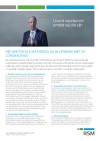By letter of April 24, 2020, the Dutch Secretary of State for Finance announced six new tax measures related to the COVID-19 crisis. The details of the measures will be further elaborated by the government. The measures are intended to take effect as soon as possible. Below we provide an overview of these measures.
COVID-19 provision for Dutch corporate income tax purposes
The Dutch government has announced to introduce the possibility for companies that are subject to Dutch corporate income tax purposes to form a tax deductible provision in the 2019 corporate income tax return for the expected loss in 2020 as a result of the COVID-19 crisis. By allowing the formation of such a provision Dutch taxpayers can file a request for an additional assessment for 2019 that would result in a refund of the corporate income tax paid for 2019. Such a refund would normally be granted in 2021 when the corporate income tax return for 2020 is filed. In respect of the provision it is mentioned that the provision can only be taken into account up to the 2019 profit. A further limitation is that solely expected losses incurred as a consequences of the COVID-19 crisis in 2020 are eligible for the provision. This measure can have a significant positive impact on liquidity position of companies that are subject to Dutch corporate income tax.
Lowering of the minimum salary requirement
Shareholders with a share interest of 5% or more who work for their own company have to meet certain minimum salary requirements (“gebruikelijk loon”). These requirements also apply if the company has no or little turnover. As a result of the COVID-19 crisis it is expected that a lot of companies will experience a loss of turnover. Therefore, it is temporarily possible to reduce the minimum salary. The decrease in salary should be in proportion to the loss of turnover.
Loosening hour criterium entrepreneurs
Entrepreneurs are eligible for certain tax deductions, amongst which a deduction for self-employed persons (“zelfstandigenaftrek”), if they work a minimum of 1,225 hours per year for their own company and qualify as entrepreneur for Dutch personal income tax purposes.
Because it might not be possible to work the minimum number of hours this year as a result of the COVID-19 crisis a loosening of the hour criterion has been announced. For the period from 1 March 2020 up to an including 31 May 2020 entrepreneurs are presumed to have worked a minimum of 24 hours per week for their own company, even if that was not the case. This presumption also applies for entrepreneurs that have seasonal dependent work, for instance in the hospitality or catering branch. As a result, this measure allows to apply certain tax deductions.
Work-related costs scheme
Under the work related costs scheme employers can spend part of their total taxable wage on allowances, benefits in kind and provisions for employees without tax liability. This so-called discretionary scope will increase from 1.7% to 3% for the first € 400.000 of taxable wage. This will allow employers, who have the financial means, to show a sign of support to their employees in these difficult times, for instance by sending them flowers or a gift certificate.
Extension of new legislation regarding excessive debt funding
The implementation of the bill with regulations to limit excessive debt funding between Dutch companies and their shareholders will be extended with one year and is now expected to take effect per January 1, 2023. This gives shareholders that have taken up a loan from their company in excess of EUR 500,000 more time to prepare for the new rules.
Payment break for mortgage payments
Lenders such as banks have offered their individual clients a payment break for mortgage payments as a result of the COVID-19 crisis. Without additional regulations the deferral of interest and repayments can have an adverse effect for the Dutch taxpayers in the sense that this could result in a denial of the deduction for the interest expenses. This would, for example, be the case when the deferred payments are not brought in line with the original repayment scheme before year end 2021.
These rules are relaxed as the new rules will allow taxpayers to spread the additional payments over the remaining term of the loan (with a maximum of 360 months). Furthermore, the decree also provide with the possibility to split the remaining loan. By doing so the deferred payments are not necessarily spread over the term of the loan but can be repaid separately in, for example, a term of 5 years.
More Information?
Please contact your RSM advisor to further discuss which measures may be relevant for you and your business.
Download 'New Dutch tax measures related to the COVID-19 crisis' in pdf.

